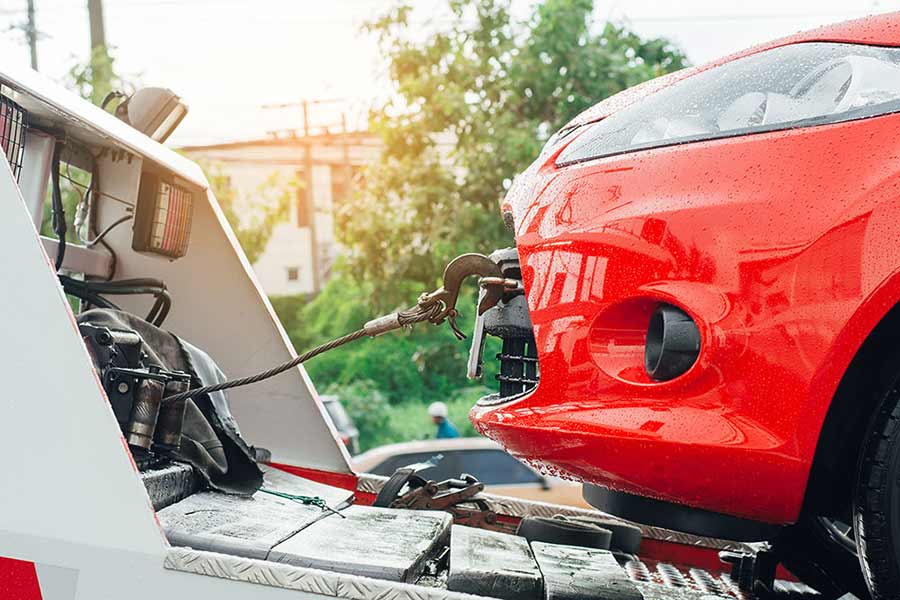How Does a Repossession Affect Your Credit?
Your car just got repossessed. Maybe you saw it coming, maybe not—but either way, it’s a stressful situation. And now you’re asking the right question: how bad is this for your credit score?

The short answer is—it’s not great. But how much damage it does depends on how it happened, whether it was voluntary or not, and what you do next. The impact won’t last forever, but it can make life harder in the meantime. Let’s break it down.
How Repossession Gets Reported to the Credit Bureaus
When a lender takes back a car because the loan hasn’t been paid, it’s called a repossession. It usually means you’ve missed multiple payments and the lender has decided you’ve defaulted on the loan.
A repossession shows up on your credit report in a few different ways:
- Account status – The original auto loan will be marked as “repossession,” “charged off,” or “closed” with a balance still owed.
- Payment history – Late payments leading up to the repossession stay on your credit report and hurt your credit score.
- Public records or collections – If the lender sells the car for less than you owed, the remaining balance can go to collections or even court, both of which add more negative marks. A judgment is the most damaging of these outcomes. It’s a court ruling against you for the unpaid balance and shows up in the Public Records section of your credit report—on top of the other negative marks already tied to the repossession.
There are two types of repossession: voluntary and involuntary. A voluntary repossession happens when you return the car yourself. Involuntary means the lender sends someone to take it back. Both hurt your credit score, and lenders treat them similarly, but a voluntary repo might look slightly better to a future lender because you took some responsibility.
How Much Does a Repossession Hurt Your Credit Score?
A repossession can knock your credit score down by 50 to 150 points, depending on where your score started and what else is on your credit report.
The damage happens because of several things:
- Missed payments – These get reported before the repo even happens and are a big part of your credit score.
- Loan default – Repossession usually means you defaulted on the loan, which is a serious negative.
- Collection activity – If you owe money after the car is sold, the balance might be sent to collections.
- Charge-off – The lender may give up trying to collect and mark the account as a loss, which results in a charge-off and hurts even more.
The exact impact depends on your credit profile. If your credit score is already low, the drop might be smaller. If your credit score is high and your credit report is otherwise clean, the hit will likely be larger. Other factors like how long you’ve had credit and whether you have other recent negatives also play a role.
How Long Does a Repossession Stay on Your Credit?
A repossession stays on your credit report for seven years from the date you missed your first payment—not from the date the car was taken.
This matters because the repo usually happens a few months after the first missed payment. That missed payment date is what starts the clock. Even if the car is sold or the balance is settled, the repo stays on your credit report for the full seven years.
The good news is that the impact fades over time. A repossession hurts the most in the first couple of years. If you start rebuilding right away and keep everything else clean, lenders may be willing to work with you again before the seven years are up.
Options for Removing a Repossession From Your Credit Report
Most repossessions are legally accurate, and if that’s the case, they usually stay. There’s no legal requirement for a lender to remove a valid repo—even if you pay it off later.
However, if there’s an error on your credit report, you can dispute it. Look for:
- Incorrect dates
- Wrong balance amounts
- Markings that say it’s unpaid when it’s been settled
You can file disputes with each of the major credit bureaus. If the lender can’t verify the details, it may get deleted.
Some people try sending goodwill letters to ask for removal, especially if they’ve paid off the balance and have otherwise clean credit. Sometimes this works—but not often. You can also try to negotiate removal as part of a settlement, but lenders aren’t required to agree.
What Happens After the Car Is Taken Back
The repo isn’t the end of the debt. After the lender sells the car, you may still owe money. This is called a deficiency balance—the difference between what you owed and what the car sold for.
If you don’t pay it, a few things can happen:
- Debt collections – The lender may send the balance to a collection agency.
- Lawsuits – You could be sued in civil court for the remaining balance.
- Wage garnishment – If a court grants a judgment against you, part of your paycheck could be withheld.
These steps vary by state, but they’re all possible, and they can cause even more damage to your credit.
How to Start Rebuilding Credit After a Repossession
You can recover from a repossession, but it takes time and consistency. Lenders want to see that the problem was a one-time issue and that you’ve gotten back on track.
Here’s what helps:
- Pay every bill on time – Payment history is the biggest part of your credit score.
- Get a secured credit card or credit-builder loan – These tools are designed to help people rebuild credit.
- Keep your balances low – Using less than 30% of your credit limit shows you’re managing debt well.
- Avoid new debt – Don’t add more accounts unless they help with credit-building.
If you follow these steps, you could start seeing improvements in 6 to 12 months. Within two to three years, you may be able to qualify for new credit—even with the repossession still on your credit report.
Getting Approved for Credit After a Repossession
A repossession makes it harder to qualify for loans, but it doesn’t shut the door completely. Some lenders specialize in working with people who’ve had past credit issues—but you’ll usually pay for it through higher interest rates or larger down payment requirements.
Auto loans are often the easiest to get again, even with a recent repo. You may need a co-signer, subprime lender, or buy-here-pay-here dealer. Interest rates will likely be steep, but some financing options may still be available.
Mortgages and credit cards are tougher. Most lenders want to see at least one to two years of clean credit activity before approving you. They’ll look closely at your full credit report and your current income.
Here’s what lenders care about after a repo:
- How long ago it happened
- Whether you’ve rebuilt since
- If you’ve had steady income and no new missed payments
You don’t have to wait seven years to borrow again. But you’ll need to show that the repo was a one-time event—not part of an ongoing pattern.
Voluntarily Giving Back the Car
Voluntary surrender means you hand the car back to the lender instead of waiting for them to take it. Some people choose this when they know they can’t catch up and want to avoid the stress of a surprise repo.
Here’s what it can do:
- Save on fees – You may avoid towing or storage charges.
- Slightly better optics – Some lenders might view it as taking responsibility.
But here’s the downside:
- It’s still a repossession – The credit impact is about the same.
- You still owe the balance – If the lender sells the car for less than you owe, they can still come after you for the rest.
A voluntary surrender only makes sense if you’ve already explored all other options—like refinancing, selling the car yourself, or working out a payment plan. It’s not a credit-saving move, but it can simplify the process.
Final Thoughts
Repossession damages your credit. There’s no sugarcoating that. But it doesn’t define you forever—and it doesn’t block you from rebuilding.
The most important thing you can do after a repo is to take action quickly. Pay your bills on time, keep your debt low, and start using tools that help rebuild credit. Lenders care more about where you’re headed than where you’ve been. With a steady track record, you can qualify for credit again—and even come back stronger.
Frequently Asked Questions
Can a repossession be included in a bankruptcy?
Yes. If you file for Chapter 7 or Chapter 13 bankruptcy, the car loan and any remaining deficiency balance after repossession can be included. That means the debt may be discharged or restructured, depending on the type of bankruptcy. The repossession will still appear on your credit report, but the balance owed may no longer be collectible.
Does a repossession affect your ability to rent an apartment?
It can. Some landlords run full credit checks, and a repossession may raise concerns about payment reliability. If your credit score is low or the repo is recent, you might need to show proof of income, offer a larger deposit, or provide a co-signer to get approved for a rental.
Can you get your car back after it’s been repossessed?
Sometimes. Some lenders allow reinstatement of the loan if you pay what you owe, including late fees and repo costs. This option usually has a short window—often just a few days—so you’ll need to act fast. You can also try to redeem the car by paying the full loan balance, though that’s less common.
Will a repossession affect a co-signer’s credit?
Yes. If someone co-signed your auto loan, the repossession and missed payments will show up on their credit report too. It can hurt their credit score and make them responsible for the remaining balance if you don’t pay.
Can a repossession be reported to all three credit bureaus?
Yes. Most major lenders report to Experian, Equifax, and TransUnion. That means the repossession can show up on all three credit reports, and the damage will affect your credit score across the board—not just with one credit bureau.



